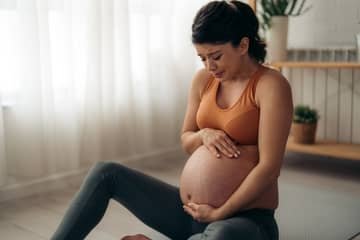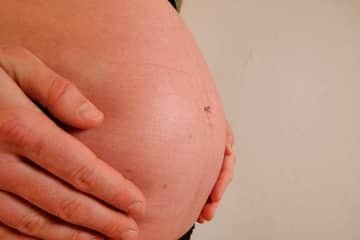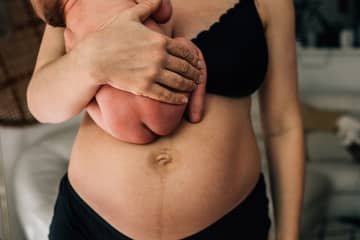
Prenatal diarrhea or vomiting? It's completely natural
Many pregnant women prepare physically and mentally for the grand finale of this nine-month period already at the beginning of their pregnancy. However, even the most numbered first-time mothers are not ready for the final weeks of the third trimester, which are characterized by certain signs of impending birth. If the symptoms came at different times, it could somehow be managed, but as if on purpose, individual prenatal symptoms often follow each other, or they have the same origin and therefore come into the life of a pregnant woman at the same time.
- Antepartum diarrhea and prostaglandin
- Diarrhea in the third trimester due to the action of relaxin
- Nausea as a sign of impending birth
- Vomiting during the third trimester
- Fight against diarrhea and nausea
- Relaxin and signs of impending labor
- Feelings before childbirth and their connection with hormonal changes
- The first signs of labor
- Messengers vs. real contractions
- Diarrhea before childbirth - experiences
- The most frequent questions - FAQ
- Comments
Such first symptoms of childbirth include diarrhea and nausea. Can these physiological manifestations of an irritated digestive tract be prevented? What other symptoms of childbirth should be prepared for in advance? How do labor pains start? Is there a way to distinguish real contractions from false messengers? If you want to know the answers to the mentioned questions, do not hesitate to dive into our article regarding the natural signs of impending labor.
Antepartum diarrhea and prostaglandin
Although diarrhea can potentially act as an initial signal of labor that occurs within 24 to 48 hours, it is often just an accompanying sign of ongoing changes in a pregnant woman's body. Difficulties with digestion and excretion of solid stools are associated with rising levels of the hormone prostaglandin in pregnant women.
While other hormones in the body are transported by blood to the areas where they are needed, prostaglandins are produced in those parts where the body needs them the most at that time. Before childbirth, the effects of this hormone are concentrated on the uterus and related processes, such as softening of the cervix and initiation of contractions. Unfortunately, these hormones have the side effect of stimulating the intestines, resulting in frequent diarrhea.

Diarrhea in the third trimester due to the action of relaxin
Diarrhea is often listed among the symptoms of childbirth. This is mainly due to the fact that it occurs as a result of ongoing changes in the body of a pregnant woman. The connection is to be found in a hormone called relaxin, which is in charge of relaxing the muscles and joints of the pelvic area in order to prepare the birth canal for the passage of the baby through them.
However, relaxin is not concentrated only on the pelvic muscles. It also focuses on other muscle groups, including the muscles of the anus. It is difficult to hold stool, and therefore you have to get used to more unpleasant and frequent visits to the toilet. However, pregnant women should avoid sitting on the toilet for a long time, because they unnecessarily expose themselves to the potential development of hemorrhoids.
Based on the above reasons, diarrhea is a completely normal part of the body's preparation process for childbirth. However, if diarrhea persists for more than two days and is accompanied by symptoms such as fever or severe abdominal cramps, a visit to a gynecologist is recommended.
Nausea as a sign of impending birth
Nausea in the third trimester, often ending in vomiting, can be an early sign of impending birth. If it is accompanied by other signals - such as diarrhea or the discharge of a mucus plug -, the pregnant woman is most likely only one or two days away from giving birth. However, nausea can have various causes.
If childbirth is literally just around the corner, the digestion process seems to shut down, thanks to which the body can focus on the birth process. Therefore, if a pregnant woman has eaten before going into labor, she may vomit, and in this way the body tries to get rid of excess substances that it does not have time to process and eliminate due to the exclusive concentration on childbirth.

Vomiting during the third trimester
The cause of vomiting before childbirth can also be the changing level of the hormone progesterone. It reaches its peak sometime around the 32nd week of pregnancy, which on the one hand prevents premature birth, but on the other hand relaxes the intestinal muscles, slows down digestion, which can be reflected in feelings of nausea.
Stomach problems can also be triggered by prenatal vitamin supplements, especially those with a high iron content. In such a case, it is advisable to consult with your doctor about the possibility of using other dietary supplements that do not have an excessively irritating effect on the digestive tract.
The state of mind can also greatly influence the state of the digestive tract of a pregnant woman. Vomiting before childbirth is therefore often attributed to nervousness. Mental well-being is very important for the healthy progress of the rest of the pregnancy and the birth itself, and therefore nervous women are advised to consult a doctor about their concerns, or to include some relaxation techniques in their daily routine.
How long the nausea will last in the third trimester is questionable and extremely individual. This factor largely depends on the physiological processes that cause vomiting. If it is a digestive problem associated with a bacterial or viral disease, nausea and vomiting should disappear after receiving the appropriate treatment.
Fight against diarrhea and nausea
The most important aspect in connection with diarrhea or vomiting before childbirth is hydration. By regularly replenishing fluids, a pregnant woman avoids contractions and associated false labor. If there are difficulties with maintaining fluids in the body, it is recommended to visit a doctor or an emergency room, where fluids and necessary substances are given to the pregnant woman through infusion.
Indigestion causes extremely fast travel of food through the digestive tract, which leads to minimal absorption of energy from ingested food. Sleep and rest are therefore crucial for a pregnant woman.
Women should generally eat more often and in smaller portions during pregnancy, which also applies if they suffer from digestive problems in the third trimester. They should eat easily digestible foods, such as toast, crackers, bananas or chicken soup.
In order to avoid impending diarrhea or vomiting, it is advisable to completely exclude certain foods from the menu. Pregnant women should avoid spicy, fatty and acidic foods, but also foods with a high fat content. During pregnancy, it is also important to consult with the doctor about medications that are suitable to take in case of diarrhea and nausea before childbirth.
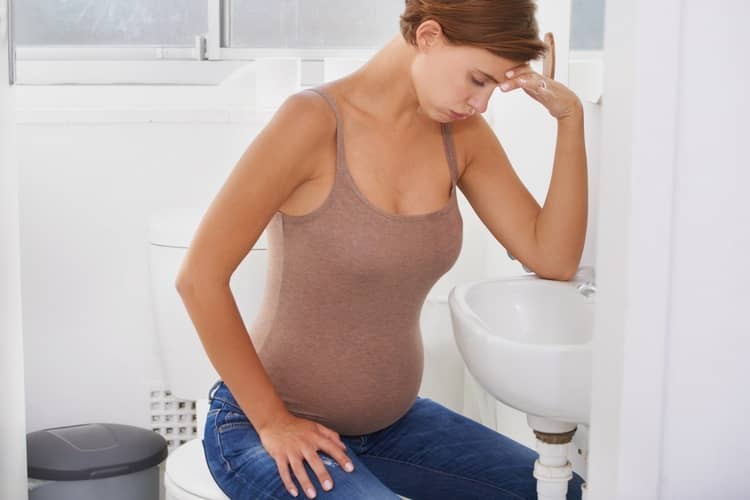
Relaxin and signs of impending labor
The relaxin hormone is responsible for preparing the female organism for the upcoming birth. Under the influence of this hormone, the pelvic muscles relax, and thus the cervix opens and shortens. In this way, the uterus with the fetus is allowed to drop into the pelvis, which leads to a wide and uncoordinated way of walking, reminiscent of a penguin.
The change in the pregnant woman's gait is also influenced by the change in the center of gravity caused by the growing belly and its decrease. The size of the fetus in the third trimester puts extreme strain on a pregnant woman's back, with the lower back area taking the brunt of it.
The gradual preparation of the body for birth by the dropping of the fetus in the third trimester will relieve the pressure exerted on the organs in the upper part of the body (such as the lungs or the diaphragm), but this time it will press on the bladder, the natural result of which is frequent urination. All the mentioned signals of the body are visibly connected to each other and are among the most common signs of childbirth.
Feelings before childbirth and their connection with hormonal changes
Hormonal changes cause different feelings in a woman's body, while the third trimester is characterized by alternating states of excessive energy and exhaustion. During this period, it is very important for a pregnant woman to gather strength and energy for the upcoming birth, which is one of the most exhausting processes that a woman's body can go through during her life.
The bursts of energy are also conditioned by hormones, which arouse a kind of nesting instinct in women. This consists in preparing the household for the arrival of the baby, such as cleaning the house, organizing the children's equipment, but also washing, ironing and folding the clothes bought for the baby.
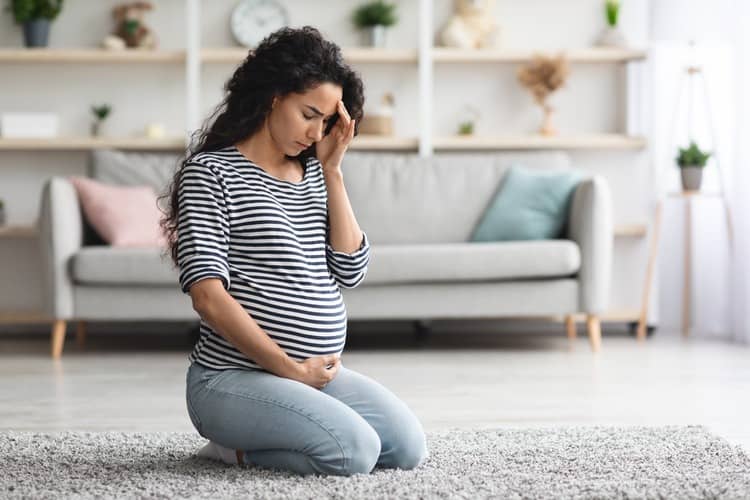
The first signs of labor
As a result of the shortening and opening of the cervix, a birth symptom known as the discharge of the mucus plug occurs, which during the entire pregnancy has the function of protecting the uterus and the fetus itself from various infections. However, the mucus plug can drain away without being noticed, mainly because the color and consistency of the vaginal discharge changes due to the coming birth.
Sometimes the mucus plug is released simultaneously with the amniotic fluid. While some women feel the leakage of amniotic fluid as a slow flow of transparent, watery liquid, others register the rupture of the amniotic membrane as one big splash that they cannot prevent. The outflow of amniotic fluid may (but may not) be accompanied by labor pains, or contractions.
Messengers vs. real contractions
During pregnancy, many pregnant women ask themselves the question "how will I know that I'm having contractions?". The solution is simple. The frequency, regularity, duration of labor pains and the length of the time interval between individual contractions are the most important aspects that distinguish real contractions from false ones.
While real labor pains accompanying childbirth are characterized by their regularity and the gradual shortening of the "rest breaks" between individual bursts of pain, Braxton-Hicks contractions are characterized by irregularity and variability of their intensity.
Real contractions last 30 to 70 seconds, while the duration of the so-called messengers is variable. The intensity is also different. The contractions accompanying the actual birth become stronger, while their intensity often does not allow the woman to move or talk naturally. The messengers can also wave at the woman, but the strength of the painful surges is alternating and can be alleviated by a hot shower or a change of position.
Diarrhea before childbirth - experiences
It is clear from internet discussions that diarrhea is a completely natural part of prenatal conditions. While some had diarrhea that lasted three days and only then gave birth, others gave birth within 24 hours of the first diarrhea. One of the discussing mothers came up with an unpleasant experience, according to which she was suddenly "attacked" by a combination of diarrhea, vomiting and contractions. However, within 90 minutes, her offspring was born.
Based on the discussion posts, it can be concluded that diarrhea and vomiting are completely natural signs of impending childbirth, although they may not appear in every woman. The course of childbirth is very individual, which also applies to the prenatal stage, which can be calmly accompanied "only" by contractions and natural changes inside the female organism due to preparations for childbirth. It is therefore important to carefully monitor the changes in your own body and contact your doctor if you are unsure.
The most frequent questions - FAQ
In an effort to stick to the topic of indigestion before childbirth and other similar symptoms of impending childbirth, we have moved some related information to the question and answer section. For any additional comments, experiences or questions related to the given topic, our readers have available the comments section, which is constantly checked.
Does every woman experience diarrhea before childbirth?
Can diarrhea trigger labor?
Is vomiting in the third trimester related to the growing fetus?
When should I go to the maternity hospital?
Pridať komentár


